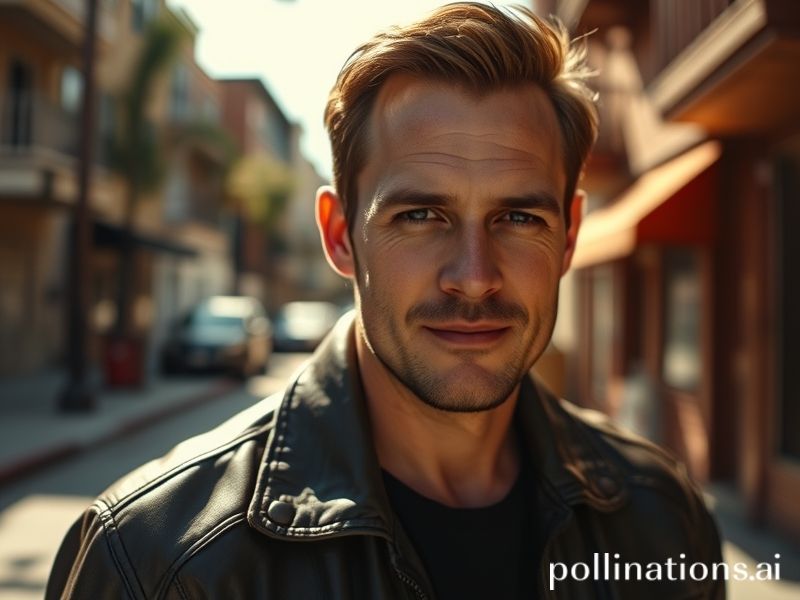The Accidental Ambassador: How Seann William Scott Became Planet Earth’s Guilty Pleasure
Seann William Scott: The Last American Export the World Didn’t Order, Yet Quietly Consumed
In the grand bazaar of global pop culture, where K-pop idols are shipped like rare minerals and Turkish dramas are smuggled across borders in USB drives the size of lethal lipsticks, one unlikely commodity keeps popping up in the discount bin: Seann William Scott. Yes, the man who taught the planet how to say “milf” without blinking is still touring duty-free shops from Dubai to Dublin, his face frozen in that eternal smirk that says, “I know this is stupid, but you paid for it.”
To the average Berlin bartender, Scott is simply “Stifler”—a human punchline that survived the Bush era like an especially durable cockroach. To a Seoul cinema programmer, he’s the reason American Pie still sells out midnight screenings, even as the peninsula itself rehearses darker plot twists. And in Lagos, where Nollywood churns out three new releases before lunch, distributors have noticed that anything with Scott’s grin on the poster moves units faster than knock-off hand sanitizer. The world, it turns out, has a surprisingly elastic appetite for low-stakes raunch delivered with Midwestern orthodontics.
How did this happen? Easy: while Washington was busy weaponizing trade deficits, Hollywood quietly perfected the art of exporting mediocrity at scale. Scott—genial, unthreatening, and visibly allergic to nuance—became the perfect ambassador. He doesn’t lecture you on democracy; he merely encourages you to laugh at a pie having carnal knowledge of Jason Biggs. In authoritarian states, that passes for subversion. In democracies, it’s comfort food for the cognitively unemployed. Either way, the royalty checks clear.
Meanwhile, the actor himself has been gamely playing along, like a hostage who’s read the Stockholm Manual. After the Pie franchise finally collapsed under the weight of its own bodily fluids, Scott tried rebranding: he went to rehab (classic), attempted indie respectability (forgettable), and even punched a koala on Australian TV—an incident that somehow boosted his Q-rating in Perth. Each pivot was dutifully chronicled by international entertainment media desperate for content cheaper than war footage. The result: a man whose Wikipedia page now exists in 47 languages, none of which bother to translate “Stifler” because why mess with perfection?
Critics, of course, remain aghast that such a lightweight artifact of late-capitalist excess continues to orbit the globe. But critics also assured us that Brexit wouldn’t happen and that NFTs were the future, so forgive the general public for trusting its own guilty pleasures. From Warsaw multiplexes to Rio favela streaming parties, audiences have discovered an odd solace in Scott’s comic nihilism. When your own government is treating you like an expendable extra, there’s something perversely reassuring about watching a fictional jerk get his comeuppance via bodily fluids you can’t afford.
And let’s not overlook the geopolitical angle: in an age where soft power is measured by TikTok dances and Marvel post-credit scenes, Scott’s enduring ubiquity is a reminder that cultural hegemony doesn’t always arrive wearing spandex. Sometimes it shows up in cargo shorts, clutching a warm beer, asking whether you’ve seen the deleted scenes. The joke, ultimately, is on the strategists who spend billions trying to win hearts and minds; turns out you can accomplish a lot with a pratfall and a well-timed fart gag.
So as COP delegates argue over carbon ceilings and central banks tighten the monetary noose, Seann William Scott endures—proof that humanity would rather binge-watch its own mediocrity than confront the abyss. You can almost hear him chuckling from whatever rooftop bar in Bangkok he’s currently haunting: “Dude, I just wanted to get laid in high school. Now I’m a transcontinental coping mechanism.”
And that, dear reader, may be the most honest foreign policy statement of the 21st century so far.







